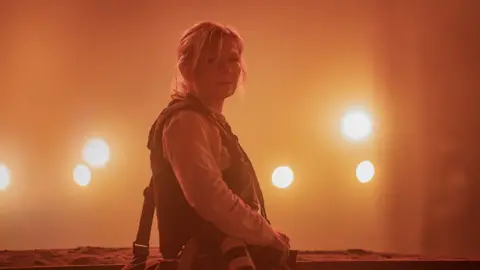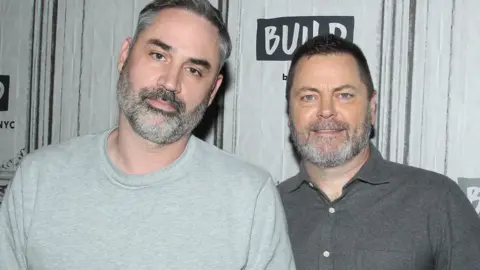Kirsten Dunst: 'I didn't even think to ask for equal pay'
Hollywood star Kirsten Dunst has said she grew up at a time when there was "major pay disparity" between herself and her male co-stars.
She said she was paid less than male co-stars, even though she had more box office success, with films such as Jumanji (1995) and Bring It On (2000).
"I was very young and it just felt like at the time, what do you do?" she said.
"I was 17, I was still learning my taste in film. I didn't even think to ask," she added.
Dunst has previously referred to the pay gap between her and actor Tobey Maguire, who she starred alongside in Spider-Man in 2002, as "very extreme".
Alex Garland, who directs Dunst in his latest film, Civil War, agreed it had been a major issue but "nobody questioned it, male executives didn't question it, these were all inherited opinions. They weren't thought about."
Dunst plays a war photographer documenting the United States in the grip of conflict and falling apart.
The star says the dystopian movie is "very much a warning" about what can happen.
The film "leaves people with so much to think about" and "is a very moving, realistic piece about journalists", the actress adds.
Dunst, 41, says it is refreshing her character is the lead in an action film and not a "damsel in distress".
She drew inspiration for the role from the famed war correspondent, Marie Colvin.
 Civil War, A24
Civil War, A24In the film, US government forces are fighting the separatist "Western Forces" led by Texas and California.
The civil war of the film's title appears to have been sparked by the president, played by Nick Offerman, who has ripped up the constitution by serving a third term in office (no-one is allowed to serve as president more than twice).
Parallels have been drawn to current US politics and events such as the 6 January insurrection, when supporters of Donald Trump attacked the Capitol Building in Washington DC.
But Garland, who also wrote the film, says the themes are not just about the US.
"The film is set in America but really this film is about two things. It is about journalists and it's about polarisation. Populist politics and polarisation which lead to extremism and extremist thinking."
Garland, who wrote 28 Days Later and Ex Machina, adds: "That's happening in America but it's happening here in this country [the UK] and it's been happening here for a long time and it's happening across Europe, the Middle East, Asia. I could list the countries where that would be true."
He adds that journalism is "under attack" which he finds "strange, scary and dangerous".
"You get people saying 'Do not trust the BBC' and you will be in places where you would be attacked and criticised for saying the unbiased news reporting organisation that you belong to."
The director says he was trying to showcase "old fashioned journalists" who document what is happening, without bias or opinion and leave other people to interpret what they do.
 Getty Images
Getty ImagesThe film has garnered largely positive reviews, with The Telegraph's Robbie Collin awarding it five stars.
"Civil War moves in ways you'd forgotten films of this scale could," he wrote, "with compassion for its lead characters and a dark, prowling intellect, and yet a simultaneous total commitment to thrilling the audience at every single moment.
"Each leg of the journey toggles between pin-drop suspense and rivetingly frantic firefights, often staged with a mesmerisingly surreal edge."
Empire's John Nugent, giving it four stars, added: "It never lets up, always gripping, always pummelling your senses, always ghoulishly compelling. Whatever your response to its political prevarication, this is undeniably confident, intense, sweaty-palmed filmmaking at the highest level."
But the Guardian's Adrian Horton was less keen, awarding it three stars overall. Civil War is "decidedly anti-war but firmly unspecific", she said, "assiduously avoiding any direct correlation to current politics or, it turns out, any politics at all".
"The distance," she concluded, "makes for an at times frustrating watch - stimulating on the level of adrenaline, not emotions."
'Old men'
Dunst grew up in front of the camera, beginning her career when she was three years old.
She says pay disparity isn't the only issue when it comes to sexism in the movie industry.
One of Dunst's leading roles in her early 20s was in Sofia Coppola's 2006 Marie Antoinette biopic.
She played the titular role and says the movie "was panned" by film critics.
"The people that were watching that movie were my age, they weren't movie reviewers. Movie reviewers were old men. So to me, the people that enjoyed Marie Antoinette have now grown up and are like 'We loved this movie' but they weren't the people writing the reviews.
"We grew up in a world where it's man-kind, man-made, man this, man that, that's how we grew up."
But Dunst does think times have changed: "Hopefully, the way I carve my path will help other actresses."
Civil War is released in the UK, US and Canada on 12 April.
